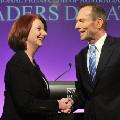
Workers need a party of their own!
Julia Gillard has called the Federal election for August 21, just weeks after her coup against Kevin Rudd. While for now Gillard is more electable than Rudd, there has been no fundamental shift in Labor policies – the only exception being the cave in to the mining bosses.
Both Gillard’s’ Labor Party and the Coalition led by Tony Abbott support privatisation, free trade, the war in Afghanistan and the detention of refugees. Neither Gillard nor Abbott has a serious plan to address climate change and while one has introduced a raft of anti-worker laws, the other has refused to repeal them.
Many workers voted for Labor in 2007 in the hope that they would wind back many of John Howard’s reactionary policies. Unfortunately Labor being a party that is wedded to the capitalist system is both unable and unwilling to implement any real reforms.
Many people will be sickened at the thought of a return of a Liberal government. The memory of Howard’s reactionary policies is still deeply ingrained in the minds of many workers. It is understandable that many people will feel the need to hold their nose and vote for Labor in order to keep the Liberals out. Others will vote for the Greens as a party that at least has some policies on paper that are progressive.
But none of these options will solve the lack of a political voice for working people. There is no fundamental difference between the policies of Labor and the Liberals. While the Greens may seem like a better option their actions in Tasmania show that when they get into power they cave into big business and implement the same policies as the major parties.
The election campaign takes place in a period of relative political quiet in Australia. The world economic downturn has not hit as hard as it has in Europe or the US and this means that the government is under less pressure to implement the types of austerity programs we are seeing in places like Greece or Britain.
In this sense the election campaign is much like a phoney war where both parties have near identical programs but one tries to out do the other on rhetoric and secondary issues. While the economic conditions are giving both sides some breathing room, the situation under the surface is far from stable.
Unemployment seems low but the biggest problem facing workers is that of underemployment. When the economic crisis hit employers responded by reducing the hours of thousands of workers. In many case these hours have not been restored and a large section of the population needs more work than they can get.
Also when the last Federal election was held in 2007 the budget was in surplus to the tune of billions of dollars. After the financial crash in 2008 the Rudd Labor government spent billons of dollars on stimulus packages. While these packages did help prop up the economy the price was the wiping out of the surplus and the racking up of a large debt. This debt however is not as high as other advanced capitalist countries despite what Tony Abbott says.
Both Labor and the Coalition agree that the priority is to bring the budget back into surplus. As we have seen with the mining tax debate, big business is not prepared to sacrifice their profits. They want a government that will make cuts to welfare and state spending so that it is ordinary people who are forced to pay.
The other factor that has helped prop up the Australian economy is the mining boom and exports to China. Unfortunately though China is now facing a slowdown due to overheating and a property collapse. Its main export markets are mired in recession and Europe is facing a serious sovereign debt crisis.
Many economists are now warning of a double-dip recession which would lead to more job losses and a further reduction in living standards. The Australian economy would not be immune as it is tied to the world economy by a thousand strings. With the huge budget deficit more stimulus packages would be hard to implement. Instead even more cuts will be pushed through.
Regardless of another downturn, whichever party comes to power they will at some stage be forced to take measures against the working class in order to return the budget to surplus and restore investor confidence. We need look no further that Europe to see numerous examples of governments implementing cuts in order to save the system. This is the music for the future in Australia.
While the big business elite has two parties to vote for who are willing to implement austerity, the striking feature of the Australian political situation is that workers, the unemployed and young people have no mass party of their own.
Workers need a party that unashamedly represents their interests over those of the big business elite. We call on trade unions to follow the lead of the Electrical Trades Union (ETU) in Victoria and disaffiliate from the Labor Party. But more than just breaking ties with Labor, unions should join with progressive community groups and the existing left parties and form a new mass workers party. This would not only give ordinary people an option at election time but it could be used to advance workers and community struggles.
As a step in this direction, the Socialist Party is calling for the biggest possible left vote in this federal election. We urge people to vote for socialist and independent left candidates where they are standing. It is best to direct your preferences to the most progressive candidates and to put reactionary and racist candidates last. Ultimately though, working class people need to prepare for the attacks that are coming regardless of who wins on August 21. The relative quiet will not last forever.

Be the first to comment